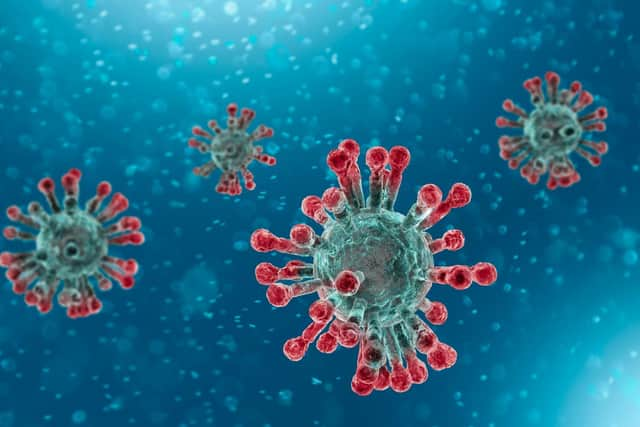Third case of Coronavirus confirmed in Kirklees
and live on Freeview channel 276
Kirklees Council has confirmed it is working closely with Public Health England to minimise risk to the public.
Rachel Spencer-Henshall, Director for Public Health in Kirklees, said: “Specialists at PHE are taking swift action to follow up with the contacts of all confirmed cases, ensuring they receive the correct medical advice and guidance.
Advertisement
Hide AdAdvertisement
Hide Ad“In the meantime, good hygiene is the very best prevention, and there are some simple steps we can all take to protect ourselves, our families and communities.


“This includes washing hands regularly for a minimum of 20 seconds, and following NHS advice in relation to coughs and colds – catch the sneeze in a tissue, bin it and kill the germs.”
There are 1,391 confirmed cases in the UK and 35 fatalities.
The Prime Minister Boris Johnson issued a stark warning on the virus calling it the "worst public health crisis for a generation." He added that the Government was also "considering the question of banning major public events."
Key questions around coronavirus
What is coronavirus and should you be concerned?
Advertisement
Hide AdAdvertisement
Hide AdA coronavirus is a type of virus. As a group, coronaviruses are common across the world.
Generally, coronavirus can cause more severe symptoms in people with weakened immune systems, older people, and those with long term conditions like diabetes, cancer and chronic lung disease.
What are the signs and symptoms of this new virus?
The symptoms of this new coronavirus (COVID-19) include cough, fever, shortness of breath, or flu-like symptoms. The current evidence is that most cases appear to be mild.
If you have returned from any of the specified countries and areas listed on this page, you should follow the advice that is relevant to you.
What is the current risk level to the UK?
Advertisement
Hide AdAdvertisement
Hide AdWe have been working in close collaboration with international colleagues and the World Health Organisation to monitor the situation in China and around the world.
Based on the World Health Organization’s declaration that this is a public health emergency of international concern, the UK Chief Medical Officers have raised the risk to the public from low to moderate. This does not mean we think the risk to individuals in the UK has changed at this stage, but that government should plan for all eventualities.
How many cases do we have in the UK?
As of 9am 11 March 2020, a total of 27,476 people have been tested in the UK, of which 27,020 were confirmed negative and 456 confirmed positive. Six patients who tested positive for coronavirus have sadly died.
The patients are receiving specialist NHS care, and we are using tried and tested infection control procedures to prevent further spread of the virus. Experts at PHE continue to work hard tracing patient contacts from the UK cases.
How does this new coronavirus spread?
Advertisement
Hide AdAdvertisement
Hide AdBecause it's a new illness, we do not know exactly how it spreads from person to person, but similar viruses spread by cough droplets or sneeze droplets. These droplets fall on people in the vicinity and can be directly inhaled or picked up on the hands and transferred when someone touches their face.
How long any respiratory virus survives will depend on a number of factors; for example:
What surface the virus is on
Whether it is exposed to sunlight
Differences in temperature and humidity
Exposure to cleaning products
Under most circumstances, the amount of infectious virus on any contaminated surfaces is likely to have decreased significantly by 24 hours, and even more so by 48 hours.
What can you do to reduce the risk of catching coronavirus?
There are things you can do to help stop germs like coronavirus spreading:
Advertisement
Hide AdAdvertisement
Hide AdAlways carry tissues with you and use them to catch your cough or sneeze. Then bin the tissue, and wash your hands, or use a sanitiser gel.
Wash your hands more often than usual, for 20 seconds each time with soap and water or hand sanitiser, especially when you: get home or into work, blow your nose, sneeze or cough, eat or handle food, avoid touching your eyes, nose and mouth with unwashed hands, avoid close contact with people who are unwell.
Is hand sanitiser effective?
The best way to protect yourself from infections like coronavirus is to regularly wash your hands with soap and water. If soap or water aren’t available and your hands are visibly clean, then sanitiser gel can be used. But proper hand washing is the most effective method and this should be your first choice.
Should people avoid shaking hands?
We may get to a point where if we see more widespread infection we ask people to limit the social contact they have with each other.
Advertisement
Hide AdAdvertisement
Hide AdThis could include limiting everyday interaction, although we’re not there yet. What’s most important at the moment is that people practice good hand and respiratory hygiene and wash their hands frequently and thoroughly.
Should people wear face masks to protect themselves from infection?
Face masks play a very important role in clinical settings, such as hospitals but there’s very little evidence of widespread benefit from their use outside of these clinical settings. Facemasks must be worn correctly, changed frequently, removed properly and disposed of safely in order to be effective.